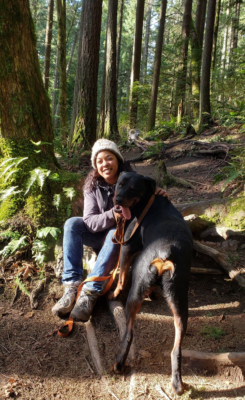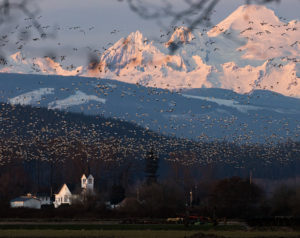Editor’s note: Welcome to The Pandemic is Personal, a weekly series focusing on on how the novel coronavirus (SARS-CoV‑2) is affecting the everyday lives of people throughout the Pacific Northwest. We hope to enlighten you and reflect on what you and others are addressing as this pandemic runs its course. If you have a story to tell, please feel free to contact us.

In this installment, we’ll hear from Germaine Kornegay. Originally from Philadelphia, Germaine has been a small business owner for twenty-four years and a member of the Sedro-Woolley City Council since 2014. She has been a Domestic Violence and Sexual Assault Advocate for Skagit County, an advocate at the Oasis Teen Shelter, a counselor at the local Boys and Girls Club, and a “gentlelady farmer” who has raised chickens for ten years.
In Washington State’s Skagit County, where the population is just over 129,000, we’ve recently opened up our first drive-through testing site.
Our Skagit County Public Health Department has been keeping us updated on cases, hospitalizations and deaths. We had a local choir group who met after a rehearsal and twenty days later, two were dead and twenty-eight of forty-five present tested positive for COVID-19. They took all of the precautions known at the time, but were unaware of the virus spreading through droplets in the air.
It’s grim, but our community is resilient. I learned that after the Cascade Mall shooting four years ago. Here in Skagit County, we are a tight-knit community of small towns, so our local network helps one another in so many ways.

Our principal county food bank, Helping Hands in Sedro-Woolley, is our pride and joy. Helping Hands typically supplies other local food banks throughout Skagit County, but they are now all closed, bringing all clients in the area to Helping Hands.
With the new physical distancing requirements and a doubling of normal distribution requirements placed on Helping Hands, we’ve needed more volunteers.
We’ve also had to replace some of our usual volunteers as well, who have had to stay home as they are among our most vulnerable.
I personally upped my volunteer hours until the National Guard came in to help. We are so grateful for their presence – and some of the Guardsmen and Guardswomen are from Sedro-Woolley.
Local farmers are kicking in and folks like myself are raising money. I raised over $1,000 through my birthday event last month for Helping Hands (thank you to those able to give!) and it’s not too late if you would like to contribute.
The city has made it possible for employees to work from home whenever feasible. Our police and fire departments are, like most these days, stretched thin.
Mask wearing and shaming is a strange new phenomenon.
Some here don’t believe in science when it disagrees with a belief, and it’s becoming as divisive as everything else these days.
An upriver Facebook group had to remove a post where a woman pointed out a group at a business establishment that were not wearing masks.
Disturbingly, at essential businesses such as grocery stores, it was rare to see anyone other than the workers (myself and a couple others) wearing a mask — a huge risk to the essential workers. But at the garden centers that are open, everyone was wearing one. (I actually didn’t expect to see them open the first time I went a garden center since the outbreak of the virus, and left mine in the car at home. Of course, all my neighbors were there with theirs on. Oops.)
I am working to get the Governor to see pet grooming, especially with the upcoming warm months and its accompanying flea season, as essential.
After a discussion with my state senator, I’ve been trying to form an alliance with other grooming businesses in the area to put forward similar requests with good reasoning behind the idea and workable plans on how to minimize issues.
Some, instead, called my landlord to ensure I wasn’t grooming, which was disappointing. There is enough business for us all, and I presently have a waiting list of 150+ dogs as a one-woman shop with temperatures some days trending toward 80 F (and sometimes even inching just beyond). I am going to be overwhelmed when I return to my business. Feast or famine!
The local thrift shop will soon be overwhelmed with my spring cleaning donations. Most people I know locally are in self quarantine, so I spend time getting my garden together, cooking and calling friends while I walk my adopted Rottweiler, Trey. Thankfully, I adopted Trey from Seattle Purebred Dog Rescue right before the news of the virus hit us.
Skagit County will lose tons of revenue this year without tourism.
It’s a $65 million a year business here. More than a million people come to see millions of tulips in bloom every year through the Skagit Tulip Festival and the display garden tours at Tulip Town and RoozenGaarde — but not this one.
(They are doing virtual tours and bulbs can be ordered.)

For tax revenue, Sedro Woolley counts heavily on small businesses and they in turn rely on tourism, especially this time of year with such events as Woodfest, Blast from the Past and the Helping Hands Food Bank Beer Festival. We will lose a substantial amount of business from tourism this year.
The meager levels of incoming tax revenue we’re seeing could lead to us temporarily cutting purchases and other expenses from our city budget. We will also have a lot of making up to do, but a longer way to go, than larger cities.
As far as our local businesses go, many were operating on tight budgets already, as expected in a small town. At least a few will not be able to return, unfortunately. The community is doing all it can to support them, and our local restaurants are overwhelmed with takeout orders. I try to support them as well, but many are closing early in the day as they run out of supplies.
Being a small community with 12,000 residents, we really cannot afford to lose a single business. I hope that most of them can hold on until we get to the other side of this. I see the light at the end of the tunnel. When going through hell, it’s best to keep going, as Winston Churchill once quipped.

